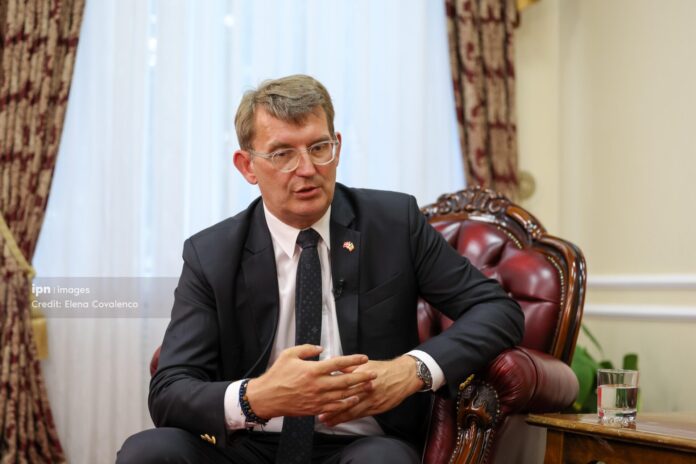Moldova and Denmark are stepping up defense cooperation, with a focus on military training and measures taken in hybrid warfare. In addition, reforms in the field will be assisted by the Danish side starting this fall, when a military attaché will be working at the embassy in Chisinau, a first for Moldova. Danish Defense Minister Troels Lund Poulsen gave more information and details about the priorities of the Moldovan-Danish cooperation in an interview with IPN.
What are the objectives of your visit to Chisinau? Who are you scheduled to meet and what key topics have you discussed with Moldovan officials?
This is a question for the politicians and the Government of the Republic of Moldova. But neutrality does not exclude the need to be able to defend yourself and your country. I have also noticed that this executive intends to invest more in the field of defense, in new capabilities, and to initiate this defense cooperation with Denmark. I think this can be a good direction for Moldova.
I am fully aware of the situation here in the Republic of Moldova, but I would like to emphasize that, from a European perspective, what we can do to support Moldova’s European course is a priority for me.
First of all, it is obvious that Russia has been active in spreading disinformation and other – I would say – serious things, with the aim of undermining the Government and the work of the Moldovan Parliament. So disinformation is indeed a reality. However, it is natural that there should be different opinions between the parliamentary parties. Elections are coming up in September, and the citizens of the Republic of Moldova will have the opportunity to cast their vote. I consider it extremely important to ensure a secure environment for these parliamentary elections so that democracy has a fair chance. This is all the more essential in the current context in which various actors are trying to spread misinformation about what is happening in Moldova.

FOR THE MOST IMPORTANT NEWS, FOLLOW US ON TWITTER!
Denmark has always supported the defense sector reform process in Moldova. What concrete forms of assistance are currently being offered and what progress has been made under the Memorandum of Cooperation signed in 2024?
First, we have now launched this completely new defense cooperation. As of November 1 this year, a Danish military attaché will be active at the Embassy in Chisinau. This is an absolute novelty, we have never seen anything like this before. This is the first time that a Danish defense minister has paid an official visit to the Republic of Moldova, and I am pleased to be the first to take this step. We will also focus on military training, hybrid warfare and other relevant issues. So there will be a broad spectrum of areas of cooperation.
Are new military or professional training projects planned for Moldovan military?
We don’t start with that. We will start with courses, educational programs and other types of training needed in a broader military context. This will form the basis of the first stage, so to speak. Later we will be open to focus on a wide range of subjects. We agreed that we will have a new round of discussions towards the end of this year or possibly early next year to assess the progress of this defense cooperation. This is something new for both Moldova and Denmark.
How do you assess the current capabilities of the Moldovan army and what prospects do you see for the development and modernization of the defense sector?
It is obvious that the Republic of Moldova does not have a tradition of having a broad spectrum of military capabilities. I know that the current government intends to invest more in new capabilities. Moldova is a small country, like Denmark, but the difference is that Denmark is a member of NATO, which means that we can share some of these capabilities. Moldova, however, has to develop them on its own, which is very expensive. I do not know in detail all the capabilities that exist in Moldova, but I think it is fair to say that more investment is needed to build a stronger defense system.


